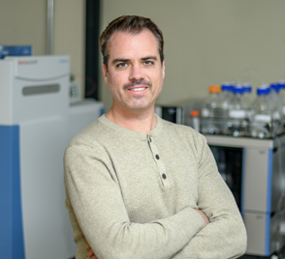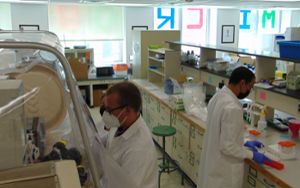A gut reaction: MSU's Robert Quinn lands gut health grant for novel research

Michigan State University biochemist Robert Quinn’s recent discovery related to bile acids produced by gut microbes represents a paradigm shift of 170 years of research in the field.
Bile acids are crucial to the human gastrointestinal system and are necessary for many processes in the human body, including fat digestion, vitamin absorption, microbiome modulation, and receptor signaling.
Bile acids were first described chemically in 1849, and Heinrich Wieland was awarded a Nobel Prize in 1927 for comprehensively describing their chemistry. This description included the final step of their synthesis — the conjugation of the amino acids taurine or glycine by our liver.
Almost a century later, research by Quinn and his colleagues led to a discovery revealing that the amino-acid conjugation of bile acids is a much more complex process than previously thought, and that much of it is done by our microbiome.
To support his research, Quinn, an assistant professor in the Department of Biochemistry and Molecular Biology in the College of Natural Science, recently received a one-year, $100,000 grant from Global Grants for Gut Health to dig deeper into this discovery and how it changes scientists’ understanding of the human gut microbiome.

The initial scientific discovery that led to the grant funding was published in the journal Nature by Quinn and his colleagues in 2020. Using novel mass spectrometry bioinformatics methods, his lab found new bile acids inside our guts made by our microbiome, the collective microbial consortia that lives inside our body.
“At this point, we have little knowledge of what these compounds do,” said Quinn, who holds a joint appointment in the College of Human Medicine. “This proposal will begin to shed light on the role of these exciting new compounds in the human gut and will provide further understanding of how our gut microbiome manipulates our physiology.”
Though the new bile acids are still mostly a mystery, they’ve recorded them more often in humans with digestive diseases, and they can be found in infants as young as two weeks old. Since the Global Grants for Gut Health is currently interested on the effects of the microbiome on developing infants, this grant was a good fit for Quinn’s research.
“We hope to uncover the reason why these bile acids are present at this young age,” Quin said. “In addition, we hope to begin to answer the other big ‘why’ and ‘how’ questions surrounding these compounds.”

Quinn and his team will locate the bacterial gene responsible for the unique bile acids. Then, by studying a unique mouse model that lacks the host-conjugated bile acids, they will record the effects of the new molecules on animals’ gut physiology and gut microbiome. Since these bile acids are quite diverse, each one may have its own unique properties and their molecules may be beneficial under different circumstances. Once they have a better understanding, Quinn’s lab hopes to uncover new, effective preventions or treatments for digestive diseases.
“In the short term, we hope to improve our understanding of bile-acid signaling and metabolism and show how MCBAs interact with and affect the host,” Quinn said. “The broader, long-term goal is to use this knowledge to develop new probiotics. If we can use the bacteria that make MCBAs to generate molecules with specific beneficial properties, these could provide novel treatment options.”
Global Grants for Gut Health is supported by a joint effort of the probiotic beverage company Yakult based in Japan, and the science publishing brand Nature Portfolio. Researchers from across the globe submit grant applications which then go through peer and expert panel reviews. Applications are evaluated on their “quality and originality of the science, potential scientific and social impact, quality of the applicant/team and value for money, and emphasis on mechanisms of action.” Only three projects are awarded each funding cycle.
Banner image: Microbiome windows of our lab in the biochemistry building at night. Credit: Quinn labs